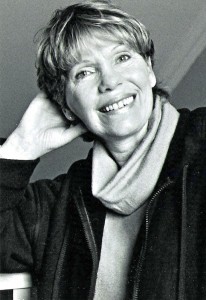 Ishbel MacAskill was sometimes referred to as “the Gaelic diva”, but while her status as a superb performer of Gaelic song was internationally recognised, her warmth and utter commitment to the cause of Gaelic culture belied the more egotistical connotations of the label.
Ishbel MacAskill was sometimes referred to as “the Gaelic diva”, but while her status as a superb performer of Gaelic song was internationally recognised, her warmth and utter commitment to the cause of Gaelic culture belied the more egotistical connotations of the label.
A late starter so far as public performance was concerned, she kept her singing for home and family for many years, never entered the competitions at the National Mod, and didn’t take the stage until her late thirties. The limpid purity of her voice, however, quickly ensured widespread acclaim, although she remained modest about her talent, expressing surprise when she received invitations to perform across the globe.
Ishbel was born in 1941, growing up in the hamlet of Broker in Point, Lewis, until she was 12, when her family moved to Stornoway, where she attended the Nicolson Institute before taking secretarial studies at Stow College in Glasgow. After marrying Bill MacAskill from Lochinver, she concentrated on bringing up their four children.
It wasn’t until 1979 that she was persuaded to sing at a Mod fringe event and with the encouragement of Bill – who would go on to manage her – and producer Noel Eadie, who coaxed her into the studio to make her first album, she embarked on a singing career that would take her from stages throughout Britain and Europe to the Celtic Colours festival in Cape Breton, Nova Scotia, the World Festival of Island Cultures in South Korea and the Smithsonian Folklife Festival in Washington. It was with considerable justification that Angus MacNeil, MP for the Western Isles, described her as “a tremendous ambassador” for Gaelic language and culture.
Her commitment to that culture saw her teaching in the burgeoning Fèisean movement throughout the Highlands and islands and she campaigned for the ensured future of the National Centre of Excellence in Traditional Music at Plockton, where she often taught.
She sang alongside American artists such as Nancy Griffiths and Ricky Skaggs on BBC Scotland’s Transatlantic Sessions series (also taking part in the stage version at Celtic Connections), and developed a parallel acting career, appearing as the shop assistant, Nora, in STV’s popular Gaelic soap, Machair.
A singer of great poise and almost crystalline clarity, Ishbel was as engaged with the lyrics and poetry of songs as with their melodies. One particularly heartfelt performance was in 1996, at the funeral of her friend, the poet Norman MacCaig, when among the songs she sang were verses to a piobaireachd which Norman used to play on the fiddle.
At one point during the late 1960s, before she was appearing in public, the established folk duo of Robin Hall and Jimmie MacGregor heard her singing at a party and tried – unsuccessfully – to persuade her to join them. It would have been an improbable combination and, in truth, although she was accompanied to an extent by other Gaelic singers and instrumentalists on her albums, her lingering tones were really at their best without accompaniment: listen, for instance to her sublime solo interpretations of An Ataireachd Ard – “The Eternal Surge of the Sea” or Pìobaireachd Dhòmhnaill Dhuibh.
The Lewis journalist and author Hector MacDonald – aka Aimsir Eachainn – once said that he had stopped watching Ishbel performing live, as he “hated to be seen crying in public”.
Ishbel died in 2011, following a fall at her home in Inverness. Among the many tributes to her, the Gaelic singer and broadcaster Mary Ann Kennedy said that MacAskill had been “blessed with a voice which drew its water from the well of the Gaelic-speaking highlands and islands, where unaccompanied song is the heart of the tradition. Her voice had a unique quality akin to the great American soul singers”.
Another magisterial voice, this time from the lowland Scots tradition, Sheena Wellington once declared that listening to MacAskill should be compulsory “for the misguided few who would still doubt the value and importance of Gaelic to the world’s culture”.